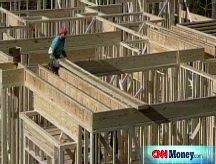Home prices plummet in a new record
National prices fell 15.4% in past 12 months. Las Vegas was the worst-hit city, while Denver and Boston saw the biggest price increases.
| 30 yr fixed | 3.80% |
| 15 yr fixed | 3.20% |
| 5/1 ARM | 3.84% |
| 30 yr refi | 3.82% |
| 15 yr refi | 3.20% |
NEW YORK (CNNMoney.com) -- National U.S. home prices fell a record 15.4% in the second quarter compared with last year, according to a report released Tuesday.
The latest S&P/Case-Shiller national home price index is down 18.2% from its peak in the second quarter of 2006, and there are no signs that the pace of home-price declines is easing. The second-quarter loss was even larger than the record 14.2% drop posted in the first three months of 2008.
Both the Case-Shiller 10-city index (down 17%) and 20-city index (down 15.9%) also posted record year-over-year losses in the second quarter.
A small piece of good news: In June the pace of monthly declines slowed ever so slightly compared with May. Prices for the 10-city index declined 16.9% year-over-year and the 20-city index was down 15.8%.
"While there is no national turnaround in residential real estate prices, it is possible that we are seeing some regions struggling to come back, which has resulted in some moderation in price declines at the national level," said David Blitzer, chairman of the Index Committee at Standard & Poor's, in a statement.
Still, all 20 cities covered by Case-Shiller are in negative territory for the past 12 months, said Mike Larson, a real estate analyst with Weiss Research. "[The moderation] is not good news," he said. "It's just a little less bad."
And with mortgage loans difficult for many home buyers to obtain and foreclosure rates still rising, inventories of homes for sale continue to expand, depressing home prices. There is now an 11.2 month supply of existing homes on the market.
"The inventory problem has not been solved," said Larson.
Peter Schiff, president and chief global strategist at Euro Pacific Capital, said the market is only about halfway to its bottom. In 2005, he predicted the then-coming bust would cut 30% off national home prices.
Losses will continue because there has been no fundamental change in markets, he said. Despite abundant foreclosure sales, inventories are still growing and lending availability is still shrinking.
And, people are not inclined to buy in a falling market. They wait for it to hit bottom. "If prices fall another 20%, that's the time to buy," said Schiff.
The worst performing city in the index was Las Vegas, where prices plunged 28.6% year-over-year, followed by Miami, down 28.3%, and Phoenix, down 27.9%.
In June, Phoenix prices dropped 2.6% from May, the largest decline of any city in the index.
Denver and Boston were winners for the month, with home prices climbing 1.5% and 1.2%, respectively. Prices have risen in both markets for three consecutive months. Charlotte and Dallas, both up 1%, have recorded four straight months of gains
The lower-priced homes are posting the biggest price declines, according to Blitzer. One reason: Lending abuses were much more common low-priced homes during the boom.
"There was more speculative lending in inexpensive homes," he said.
He cited San Francisco, where the price of inexpensive homes has fallen more than 40% from the peak, while moderate priced homes were off 30%, and expensive homes fell just over 10%.
"That's a dramatic spread," said Blitzer.
Still, Larson of Weiss Research said he believes that while year-over-year prices will continue to decline, sales of foreclosed homes will help moderate those losses by taking rock-bottom priced homes off of the market.
"Prices have fallen so much that you're starting to see sales improvement," he said. "People are snapping up a lot of distressed properties." ![]()



